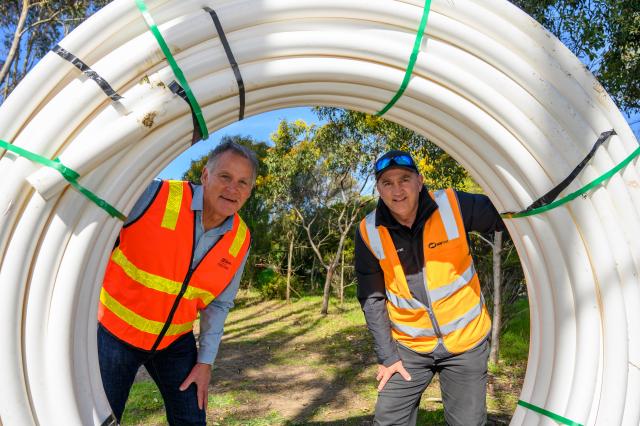Crews have begun work on installing 35km of fibre optic cable from central Geelong to Drysdale and Queenscliff.
The project is aiming to deliver high-speed internet to community, education and research facilities on the Bellarine Peninsula.
The works are a partnership between the City of Greater Geelong, Deakin University and Australia’s Academic and Research Network (AARNet).
The first stage of the project from August to December will lay 11km of fibre along the Bellarine Rail Trail from Boundary Road, East Geelong to Portarlington Road, Curlewis.
Mayor Peter Murrihy said the 12-month project will connect city facilities such as the new Drysdale Library, the Potato Shed and Drysdale Sports Precinct, to high-speed internet.
“The infrastructure delivered through this joint venture will benefit our region for many years to come,” he said.
“We’re collaborating with researchers, other levels of government, and the private sector to reach our smart city goals.
“Deakin’s flagship Marine Science Centre at Queenscliff will benefit from faster connectivity, helping researchers to share high volumes of data with other experts around the world.”
The fibre will also service Eduroam, a secure global roaming wireless network utilised by Deakin University staff and students.
Innovative Solutions Deputy Chair councillor Sarah Mansfield said the project paves the way for optical fibre to be installed to other coastal areas in the future, further supporting our smart city ambitions.
“Enhancing connectivity and data processing helps to create a smart, future-focussed city whilst stimulating economic opportunity and innovation,” Cr Mansfield said.
“This fibre provides critical backbone infrastructure to fast-track the rollout of other smart technologies which will help understand usage patterns along the Bellarine Rail Trail – a key part of our active transport network”.
Local suppliers and materials will be prioritised throughout the project to make sure the benefits stay in the region, Council said.
The works will be delivered in a sensitive way to minimise disruption to the natural landscape and pedestrians and cyclists can continue enjoying the Rail Trail.









